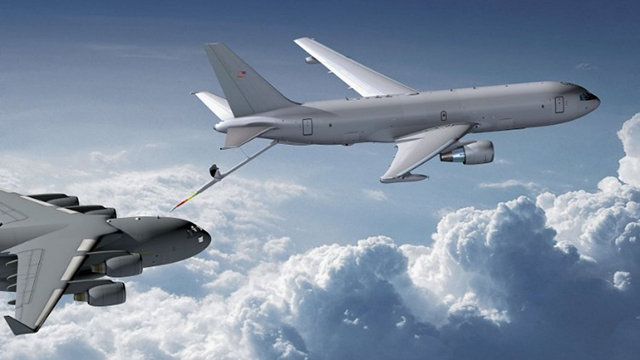Boeing is developing both a hardware and software fix for its KC-46A Pegasus aerial refuelling system that it hopes will resolve the boom axial loads issue that has so far prevented refuelling of the C-17A.
A spokesman for the US Air Force’s tanker directorate at Wright-Patterson AFB, Ohio confirmed this week that flight testing being conducted will help determine whether the fault can be resolved with a software tweak, or if Boeing must proceed with potentially more finicky hardware change.
The planned date for a “milestone C” decision from the Pentagon, which would release funding for the first two production lots totalling 19 aircraft, has already slipped from April to May and is now scheduled for June at the earliest as the KC-46 team figures out how to refuel the service’s heavy Globemaster III strategic transport aircraft, of which there are approximately 213 in active service. Of note, the Royal Australian Air Force recently certified its Airbus Military A330 Multi-Role Tanker Transport, designated KC-30, to refuel the C-17 airlifter.
“Boeing is flight testing a software fix to the boom axial loads issue now,” says the air force. “Once that fix is fully verified in flight, the C-17 and A-10 refuelling demonstrations will begin, which we anticipate to occur in late May.”
The service confirms that Boeing has been working hardware and software solutions in parallel as a bet both ways in case one correction does not work out. The USAF and Boeing so far have not been willing to discuss the fault in any significant detail, but they have said the turbulence generated by the two large aircraft flying together triggered a safety warning about higher than expected loading.

An artist's impression of the KC-46 refuelling a C-17 heavy cargo airplane
Boeing
The aircraft is equipped with a centreline hose-and-drogue system and it can also carry two optional wingtip-mounted aerial refuelling pods. The boom is the tanker's primary and highest-capacity fuel transfer point for heavy bombers, cargo airplanes and fighter and attack jets.
The programme team has already demonstrated boom functionality with the Lockheed Martin F-16 and it doesn't expect any difficulty topping up the Fairchild Republic A-10 "Warthog".
Boeing has already racked up $1.5 billion in pre-tax charges relating to the KC-46 programme, since the US government's obligation under the fixed-priced development contract is capped at $4.9 billion. Boeing announced its third, $243 million pre-tax charge during a 27 April earnings call.
Source: FlightGlobal.com























